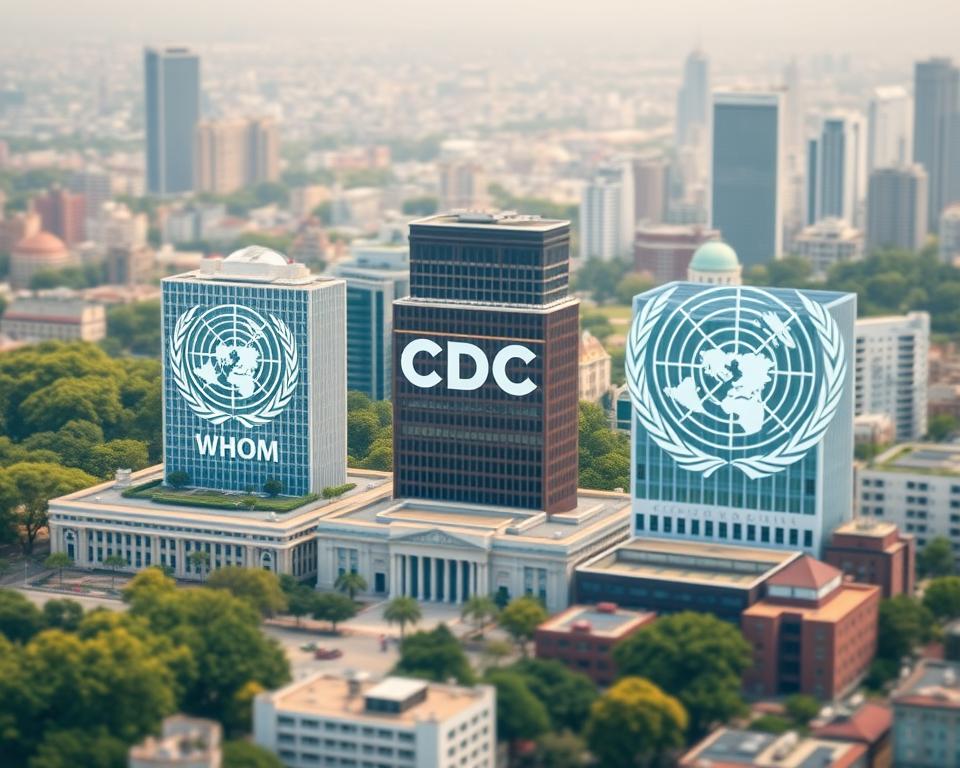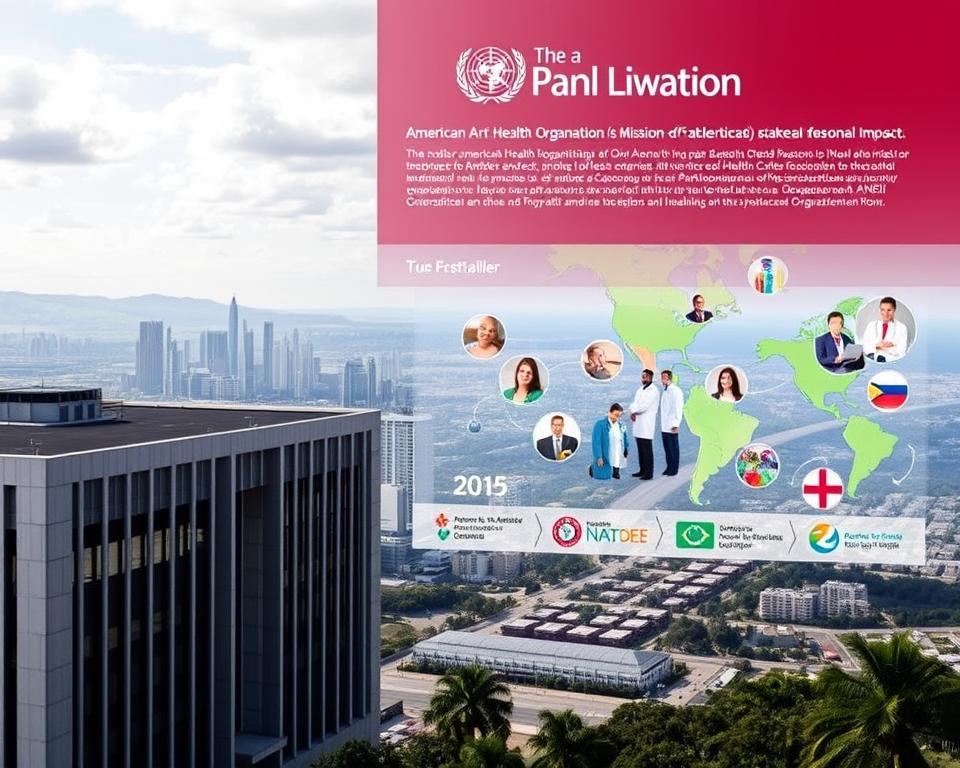
Discover the Leading Global Health Organizations
Did you know that more than 2 billion people globally still lack access to essential health services? This staggering statistic underscores the immense challenges our world faces in public health and highlights the crucial role of global health organizations. These organizations are vital in addressing health disparities that transcend national boundaries, working tirelessly to ensure that everyone, regardless of location, has access to necessary healthcare. This article will provide you with a comprehensive global health organizations list while showcasing the top global health organizations dedicated to improving health outcomes for communities worldwide.

As we explore the landscape of leading global health organizations, you’ll discover their critical objectives, the innovative initiatives they implement, and their ongoing commitment to tackling pressing health issues. Join us in learning more about the organizations at the forefront of global health improvement.
Key Takeaways
- Over 2 billion people lack access to essential health services worldwide.
- Global health organizations play a crucial role in addressing health disparities.
- This article provides a comprehensive global health organizations list.
- Top global health organizations implement innovative health initiatives.
- Understanding these organizations is vital for global health advancement.
Understanding Global Health Organizations
Global health organizations play a crucial role in addressing health challenges that transcend national borders. Their primary mission revolves around improving health outcomes across populations worldwide. These organizations can be broadly categorized into international health organizations and global health agencies. Each category carries distinct responsibilities and functions.
International health organizations, such as the World Health Organization (WHO), operate primarily under governmental frameworks, collaborating with countries to develop public health strategies and policies. These entities focus on health promotion, disease prevention, and emergency response to international outbreaks. They often set global health standards and provide technical guidance based on research and data.
In contrast, global health agencies can encompass both governmental and non-governmental organizations, providing a wider range of support for health initiatives. Non-governmental organizations like Médecins Sans Frontières (Doctors Without Borders) and the Bill & Melinda Gates Foundation work to fill gaps left by governmental efforts. They mobilize resources, deliver direct medical care, and advocate for policies that support health equity.
Understanding the functions of these organizations is essential for recognizing their significance in the global health landscape. They coordinate responses in health emergencies, conduct research, and develop best practices while advocating for vulnerable populations worldwide. This collaborative approach is vital in fighting diseases such as HIV/AIDS, malaria, and tuberculosis, which require cross-border strategies and resources.
As health issues continue to evolve, so does the landscape of global health organizations. Their efforts form the backbone of global initiatives aimed at achieving health for all, ensuring that no one is left behind in the quest for healthier communities worldwide.
The Importance of Global Health Organizations
Global health organizations play a crucial role in our health systems, addressing issues such as disease prevention and health promotion. These entities not only coordinate responses during health crises but also ensure that underserved populations receive adequate healthcare resources. The impact of these organizations is evident in their efforts to facilitate access to healthcare, especially in low-income regions where resources may be scarce.
The association of top global health organizations forms a comprehensive support network that fosters collaboration among countries. Their initiatives have led to significant improvements in disease control and health education worldwide. Furthermore, the best global health organizations utilize evidence-based methods to inform public health policies that effectively respond to emerging health threats.

Incorporating tools and strategies from the global health organizations list allows nations to build resilient health systems. An integrated approach to global health management creates pathways for sustainable development and enhanced health security across the globe.
Top Global Health Organizations to Know
Understanding the role of leading global health organizations is crucial for promoting public health worldwide. These organizations work tirelessly to address various health challenges, often focusing on disease prevention, health education, and emergency responses. Here are some of the most influential international health organizations that are making a significant impact globally:
| Organization | Founded | Primary Goals | Key Achievements |
|---|---|---|---|
| World Health Organization (WHO) | 1948 | Promote health, keep the world safe, and serve vulnerable populations. | Led global response to COVID-19; eradicated smallpox. |
| Médecins Sans Frontières (Doctors Without Borders) | 1971 | Provide medical aid where it’s needed most, regardless of politics. | Delivery of urgent medical care in conflict zones and epidemics. |
| Centers for Disease Control and Prevention (CDC) | 1946 | Protect public health and safety through disease control and prevention. | Significant contributions to the elimination of polio and other diseases. |
These prominent organizations exemplify the commitment to improving health and responding to global health threats. Each organization plays a vital role in shaping health policies and providing necessary interventions during health crises.
Global Health Organizations List
Global health organizations play a crucial role in addressing health challenges worldwide. They can be categorized into various types that include international entities, national bodies, and local non-governmental organizations (NGOs). Understanding this global health organizations list provides insight into how these groups operate and contribute to public health initiatives.
Key Types of Global Health Organizations
- International Organizations: These include groups such as the World Health Organization (WHO) and the United Nations Children’s Fund (UNICEF), which focus on health issues that transcend borders.
- National Agencies: Entities like the Centers for Disease Control and Prevention (CDC) operate within specific countries, implementing health policies and programs tailored to their populations.
- Local NGOs: Organizations at the grassroots level engage with communities directly, providing essential services and education on health-related issues.
Essential Functions of Global Health Organizations
Global health agencies are involved in a variety of critical functions that enhance health outcomes globally. Their main activities include:
- Research: Conducting studies to understand health trends, discover new treatments, and evaluate health interventions.
- Education: Providing training and resources to health professionals and the public to raise awareness about health issues.
- Advocacy: Promoting policies that support better health practices and funding for healthcare initiatives.
- Emergency Response: Coordinating efforts during health crises, such as pandemics or natural disasters, to deliver timely aid and resources.
International Health Organizations: Their Role in Global Health
International health organizations play a crucial role in the realm of public health. These global health institutions not only facilitate cooperation among nations but also create frameworks that guide health policies worldwide. Through collaborative efforts, organizations like the World Health Organization (WHO) have spearheaded initiatives that address pressing health issues, enabling countries to share resources and knowledge.
These organizations have proven essential in tackling pandemics and public health emergencies. By coordinating information sharing and resource allocation, they support nations in implementing effective health responses. This collaboration enhances capabilities to confront health threats, ensuring that countries are better prepared to manage crises.
In terms of impact, international health organizations influence health policy by providing research, guidelines, and funding for various health programs. Their ability to engage multiple stakeholders, including governments, private sector, and civil societies, fosters comprehensive approaches to health challenges. This multifaceted engagement promotes sustainable health systems worldwide.
The initiatives spearheaded by these institutions result in significant advancements in disease prevention, health education, and healthcare accessibility. The collective effort demonstrates a global commitment to improving health outcomes for all populations.
The Best Global Health Organizations Making an Impact
Numerous organizations stand out among the best global health organizations due to their significant contributions towards improving health outcomes worldwide. One notable example is Save the Children, which dedicates its efforts to promoting children’s rights, providing health services, and responding to emergencies. Their initiatives in nutrition, vaccination, and education have led to measurable improvements in children’s health in various nations.
The Global Fund represents another powerhouse in global health. Focusing on combating infectious diseases such as HIV/AIDS, tuberculosis, and malaria, it collaborates with governments and local organizations to implement effective programs. This partnership approach has resulted in substantial declines in disease incidence, showcasing the effectiveness of their strategies and funding.
Through case studies, we can observe the positive transformations catalyzed by these leading global health organizations. For example, in various regions where Save the Children operates, the rates of childhood mortality have decreased significantly due to their comprehensive health programs. Similarly, the Global Fund’s targeted interventions have saved millions of lives, illustrating their critical role in global health efforts.
Overall, the impact of these best global health organizations underscores the importance of dedicated action in addressing urgent health challenges. Their successes not only pave the way for continuous improvement but inspire other entities to follow suit in the quest for a healthier world.
Leading Global Health Organizations in Action
Global health organizations play a pivotal role in addressing health challenges worldwide. One striking example is the World Health Organization (WHO), which spearheads vaccination campaigns targeted at eliminating preventable diseases. Their efforts in polio eradication have resulted in significant reductions in cases globally. The WHO exemplifies the best global health organizations through its comprehensive programs that directly impact communities.
Another key player is Médecins Sans Frontières (Doctors Without Borders), which provides urgent medical assistance in conflict zones and areas affected by diseases. Their rapid response teams bring essential healthcare, demonstrating the vital work these organizations engage in under challenging conditions. Such initiatives highlight the importance of the global health organizations list, showcasing those committed to improving health outcomes.
The Global Fund to Fight AIDS, Tuberculosis and Malaria stands out with its focus on combating these major diseases through innovative financing and partnerships. Their success in providing treatment has empowered countless individuals, significantly influencing public health. This organization further exemplifies the strategic actions taken by the best global health organizations as they collaborate with governments and local agencies.
A comprehensive global health organizations list would not be complete without mentioning UNICEF, known for its child health and protection initiatives. Various health education programs empower families to make informed decisions regarding nutrition and wellness, fostering healthier communities worldwide. Through these impactful initiatives, these organizations demonstrate their commitment to advancing global health.
| Organization | Focus Area | Notable Initiative | Impact |
|---|---|---|---|
| World Health Organization | Vaccination | Polio Eradication | Significant reduction in global cases |
| Médecins Sans Frontières | Emergency Medicine | Healthcare in Conflict Zones | Timely medical assistance to vulnerable populations |
| Global Fund | AIDS, Tuberculosis, Malaria | Innovative Financing | Empowered individuals with life-saving treatments |
| UNICEF | Child Health | Health Education Programs | Better informed families for improved community health |
These examples showcase how leading global health organizations operate in diverse areas, proving their essential roles in health improvement and disease prevention. Their ongoing programs impact lives every day, aligning with the goals of improving health outcomes worldwide.
Global Health Agencies and Their Key Initiatives
Global health agencies play a vital role in tackling complex health challenges across the globe. Their initiatives address various issues, ranging from infectious disease outbreaks to mental health support. Organizations like the World Health Organization actively implement programs designed to enhance public health and prevent epidemics.
One notable initiative involves the response to infectious diseases, including the prevention and control of outbreaks such as Ebola and COVID-19. Global health agencies work tirelessly to provide resources and guidance to countries, ensuring appropriate measures are taken to mitigate risks.
Mental health support also constitutes a significant focus of international health organizations. Campaigns aimed at reducing stigma and increasing access to mental health care reflect a commitment to holistic health solutions. These initiatives encourage societies to recognize the importance of mental well-being alongside physical health.
| Global Health Initiative | Description | Impact |
|---|---|---|
| Ebola Response | Coordination of resources and support to affected regions. | Reduction in transmission rates and improved treatment facilities. |
| COVID-19 Vaccination Programs | Global effort to vaccinate populations against COVID-19. | Increased vaccination coverage and herd immunity. |
| Mental Health Awareness Campaigns | Promoting mental health resources and reducing stigma. | Improved access to mental health services and greater societal awareness. |
Through these initiatives, global health agencies and international health organizations exemplify their commitment to improving the health outcomes of populations worldwide.
List of Global Health NGOs: Understanding Their Contributions
Non-governmental organizations (NGOs) play a crucial role in the landscape of global health. They focus on various health challenges, making significant contributions to sectors like maternal health, disease prevention, and education. This list of global health NGOs highlights their specialized missions and the impactful work they do to advance health outcomes worldwide. Their expertise and actions are essential to addressing health issues, especially in underserved communities.
Notable Global Health NGOs
- World Health Organization (WHO)
- Doctors Without Borders (Médecins Sans Frontières)
- Global Fund to Fight AIDS, Tuberculosis and Malaria
- PATH
- CARE
How NGOs Collaborate with Governments
NGOs partner with government entities to enhance healthcare delivery and policy implementation. They provide valuable resources, research, and expertise, particularly in crisis situations. By aligning their efforts with global health agencies, they contribute to effective public health strategies and programs. Such collaboration often leads to improved health systems and better access to care for marginalized populations, showcasing the synergy between NGOs and government initiatives.
| NGO Name | Focus Area | Collaboration Examples |
|---|---|---|
| World Health Organization (WHO) | Global Health Advocacy | Guidelines on Health Policies |
| Doctors Without Borders | Emergency Medical Aid | Support in Conflict Zones |
| Global Fund | Combating Major Diseases | National AIDS Programs |
| PATH | Innovative Health Solutions | Vaccine Development Partnerships |
| CARE | Humanitarian Relief | Disaster Response Coordination |
Global Health Institutions: Foundation of Public Health
Global health institutions play a vital role in shaping the landscape of public health across nations. These institutions are paramount in researching health challenges, developing strategies, and implementing programs that address health disparities worldwide. Their expertise is crucial for forming effective health policies that align with international standards.
Many international health organizations collaborate closely with governments and local entities to enhance public health infrastructure. These partnerships often lead to the creation of frameworks that guide nations toward achieving better health outcomes. Educational initiatives spearheaded by global health institutions empower communities with the knowledge necessary to improve their well-being.
Research conducted by these institutions sheds light on pressing health issues, such as pandemics and chronic diseases. By utilizing data-driven approaches, global health institutions provide insights that drive informed decisions. This research not only influences policy but also raises awareness about public health challenges on a global scale.
The impact of global health institutions extends beyond immediate health concerns. They serve as a foundation for developing long-term strategies that promote sustainable health solutions. Their commitment to fostering collaboration among international health organizations enhances the collective capability to tackle complex health crises.
| Function | Impact |
|---|---|
| Research and Development | Provides evidence-based solutions to health challenges |
| Policy Formation | Guides health policy frameworks and regulations |
| Education and Training | Empowers health professionals and communities |
| Collaboration | Fosters partnerships among nations and organizations |
In summary, the ongoing efforts and achievements of global health institutions are indisputable. Their foundational role in public health shapes policies and practices that resonate on both local and international levels. Engaging with these institutions represents a proactive step toward improving global health for all.
Recent Achievements of Global Health Organizations
Top global health organizations have recently made significant strides, particularly in vaccine development and public health campaigns. These achievements illustrate their ongoing commitment to combating global health challenges.
Recent vaccine initiatives led by WHO and GAVI have successfully improved immunization rates, especially in developing countries. The adaptation of mRNA technology has accelerated vaccine production timelines, ensuring quicker responses to emerging diseases. Results from these efforts showcase a marked reduction in cases of diseases such as measles and polio.
In addition to vaccine advancements, the best global health organizations have spearheaded health campaigns targeting endemic diseases. For instance, the successful dissemination of educational resources has empowered communities to take charge of their health, leading to improved awareness of preventive measures.
| Organization | Achievement | Impact |
|---|---|---|
| World Health Organization (WHO) | Launch of COVID-19 Vaccination Plan | Over 1 billion vaccine doses administered globally |
| GAVI | Expansion of Immunization Initiatives | Increased coverage in low-income regions by 30% |
| UNICEF | Health Education Campaign | Reduced disease transmission rates in multiple countries |
Adapting strategies in response to evolving health challenges demonstrates the flexibility and innovation among top global health organizations. Their relentless dedication continues to yield measurable outcomes, contributing to healthier global communities.
The Future of Global Health Organizations
The landscape of global health is continually evolving, influenced by emerging challenges and technological innovations. Leading global health organizations must adapt to new realities such as climate change, which poses significant risks to health systems worldwide. Increased collaboration among global health agencies is critical in addressing these challenges effectively.
As the world becomes more interconnected, the need for a robust health response is imperative. Advancements in technology offer tools for better disease monitoring and health data sharing, and leading global health organizations are poised to leverage these innovations. For instance, data analytics and AI can enhance decision-making and optimize health interventions regardless of geographical barriers.
However, these changes are not without their challenges. Issues such as health inequities, resource allocation, and varying political landscapes require agile strategies from global health agencies. Moving forward, organizations must focus on increasing accessibility to health solutions, aligning their efforts with sustainable development goals while fostering partnerships that unite sectors beyond health, including education and finance.
The future also promises a shift in how health organizations engage with communities. Greater emphasis on local knowledge and stakeholder participation can enhance the effectiveness of health initiatives. By integrating community perspectives, leading global health organizations can better tailor their programs to meet the needs of diverse populations.
| Challenge | Opportunity |
|---|---|
| Climate Change Impact | Innovative Health Technology |
| Increased Health Inequities | Community Engagement Strategies |
| Resource Distribution | Global Partnerships |
| Political Disparities | Sustainable Development Goals Alignment |
The evolving dynamics in health call for adaptable strategies from leading global health organizations, setting the stage for a healthier future worldwide.
Conclusion
In summarizing the significance of the global health organizations list presented throughout this article, it is clear that these institutions play a pivotal role in fostering public health across the globe. From disease prevention to health education, the best global health organizations are committed to tackling the most pressing health challenges, ensuring equitable access to healthcare for all populations.
The partnership between governments, NGOs, and international health entities creates a powerful network aimed at promoting health and wellbeing worldwide. By recognizing the contributions of these organizations, we can better appreciate their impact on global health initiatives and the ongoing efforts required to combat health crises.
As individuals, we can support these organizations through advocacy, donations, or volunteer work. In doing so, we become part of a collective movement striving to enhance health outcomes on a global scale, aligning with the mission of the best global health organizations and empowering communities everywhere.







